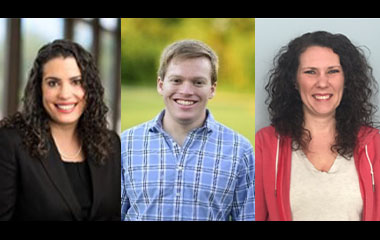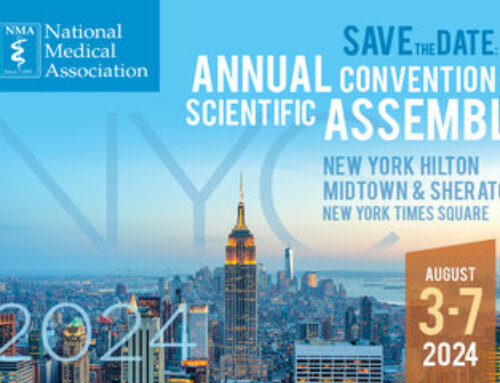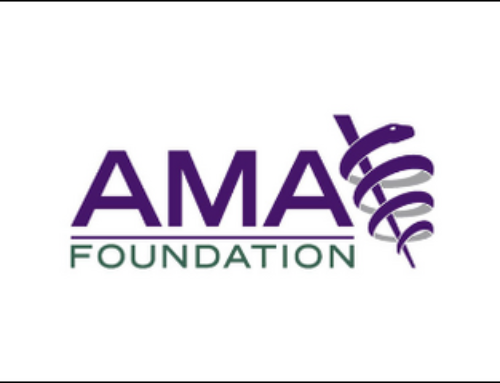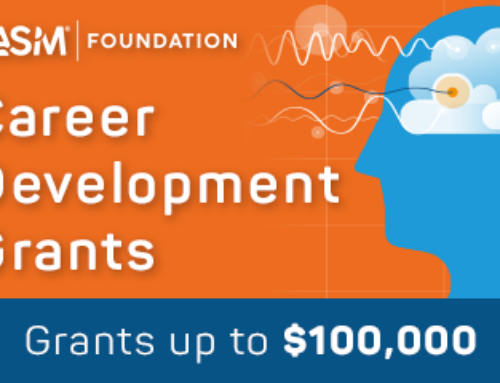Dr. Swanson’s research team
From left to right: Leslie Swanson, PhD, Principal Investigator; Trevor de Sibour, Research Assistant; Kelley DuBuc, Research Coordinator
Dr. Leslie Swanson is a clinical researcher who, amid a pandemic, is working towards finding new strategies for treating patients with delayed sleep-wake phase disorder.
Leslie Swanson, PhD, is a clinical associate professor in the Department of Psychiatry at the University of Michigan and a recipient of the AASM Foundation COVID-19 Relief Funding Award for AASM Foundation Award Recipients (2020), Bridge to Success Award for Mid-Career/Senior Investigators (2019), and the Strategic Research Award (2017). The overarching theme of Swanson’s work is discovering ways sleep and circadian systems can be leveraged to improve people’s lives.
“As a scientist-practitioner, clinical work often informs my research interests. For example, many of the night owls whom I’ve treated over the years do not achieve the type of treatment response that we aim for in sleep medicine, and the practice guidelines for circadian rhythm disorders make it clear that more clinical studies are needed to inform our treatments,” said Swanson. “This has led me to one of the focus areas of my research: testing new strategies for treating delayed sleep-wake phase syndrome. This is particularly important because delayed sleep-wake phase disorder carries a high burden of disability.”
To meet this need, Swanson’s 2017 Strategic Research Award, The Clinical Utility of Dim Light Melatonin Onset (DLMO) in the Treatment of Delayed Sleep-Wake Phase Disorder: A Randomized Trial, sought to test if personalizing the timing of melatonin therapy to an individuals’ own circadian clock resulted in better treatment outcomes for patients with delayed sleep-wake phase disorder relative to current standard of care.
“Delayed sleep-wake phase disorder is common and can be quite debilitating, but there are very few clinical studies on treatments for this sleep disorder. A unique aspect of this study is that we are using field-based, in-home DLMO collection, which may ultimately enhance its utility for clinical practice,” said Swanson. A long-term goal of this project is that it will help inform treatment guidelines for delayed sleep-wake phase disorder.
In addition, Swanson’s other research focus is the interaction among sleep, circadian rhythms, and mental health in the perinatal population. Given that women are at great risk for both sleep-circadian dysregulation and mental health disorders during the perinatal period, there is a need for accessible non-pharmacological depression therapies tailored for this population.
The goal of Dr. Swanson’s 2019 Bridge to Success Award for Mid-Career/Senior Investigators, Circadian Mechanisms of a Wearable Morning Light Treatment for Postpartum Depression, is to gather additional data and refine methods to bolster a larger-scale, NIH R01 application focused on testing a novel, wearable bright light therapy device for postpartum depression, with an emphasis on evaluating the mechanistic role of circadian change and changes in sleep in treatment response.
“A significant proportion of perinatal women suffer from depression, yet rates of treatment for perinatal depression are strikingly low. Bright light therapy holds promise for addressing treatment barriers for perinatal depression—the treatment is administered in-home, non-pharmacological, and readily accessible,” said Swanson. “Understanding whether bright light therapy works through a circadian mechanism, a sleep mechanism, or both for postpartum depression can open up a whole new avenue of treatment development for postpartum depression targeting the circadian and/or sleep systems.”
Before receiving the 2019 Bridge to Success Award for Mid-Career/Senior Investigators, Swanson was faced with the possibility of significantly reducing her research funding while preparing to resubmit her NIH R01 for a larger scale light therapy trial.
“With the AASM Foundation Bridge to Success Award for Mid-Career/Senior Investigators, I have been able to refine my approach and methods, and to maintain and further strengthen my research infrastructure in preparation for independent, R01-level funding,” said Swanson.
Like many researchers across the country, Swanson’s research was affected by the COVID-19 pandemic. Her research studies were placed on hold and she had to adapt her research protocols to maximize safety for her study participants and research staff. As a result, her research team was not able to meet original milestones for her projects and incurred unanticipated study costs. She applied and was awarded the 2020 COVID-19 Relief Funding Award to help offset those costs.
“The COVID-19 Relief Funding Award will help me and my study team fulfill our enrollment goals and complete our projects. We are very grateful for this additional funding, and excited that this relief award will enable us to achieve our full enrollment plans while providing crucial support for my research team despite the detour we have experienced with the pandemic,” said Swanson.
As Swanson works towards completing her research projects amid the ongoing pandemic, she plans to address one of the many research gaps in sleep medicine.
“Thanks to the funding I’ve received from the AASM Foundation, I’m able to take important next steps. Chief among these steps is securing independent funding supported by data I’ve collected as part of my AASM Foundation awards. Specifically, I am awaiting a funding decision for an NIH R01 on circadian/sleep mechanisms of light therapy for postpartum depression, and I have plans to submit proposals for larger-scale funding for work on treating delayed sleep-wake phase disorder based on final data from our current trial,” said Swanson.






